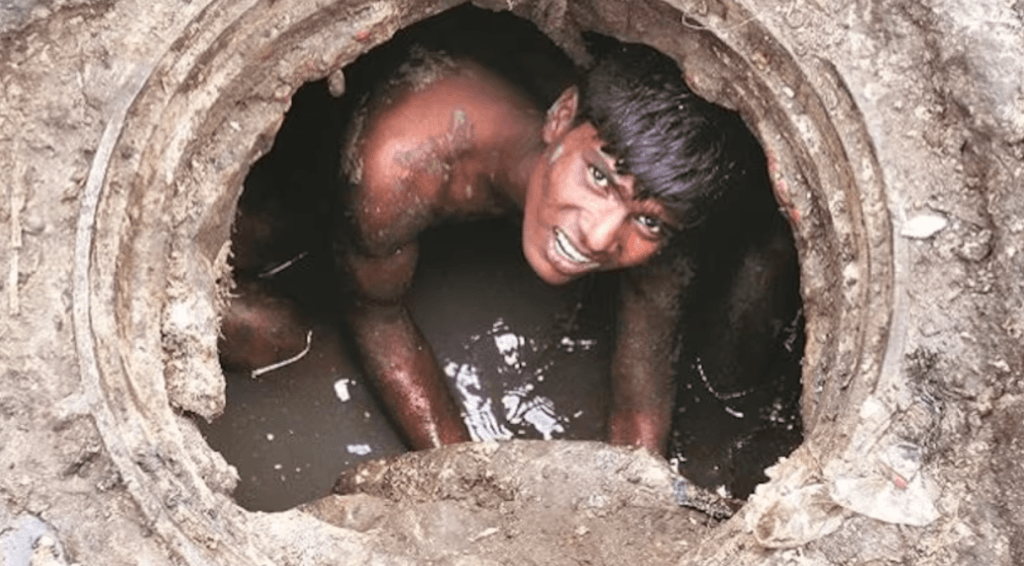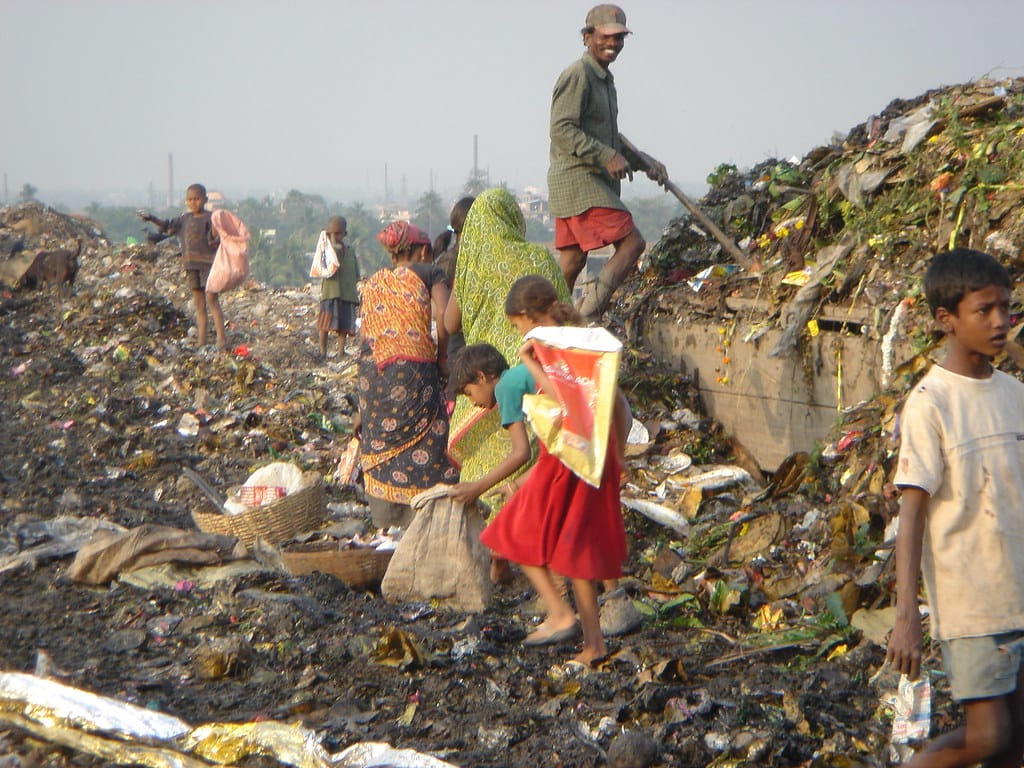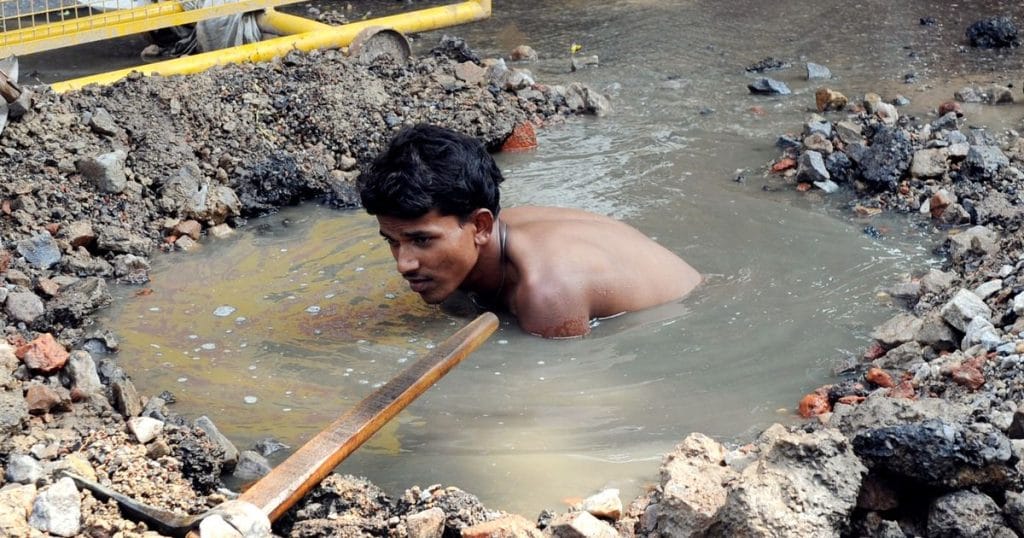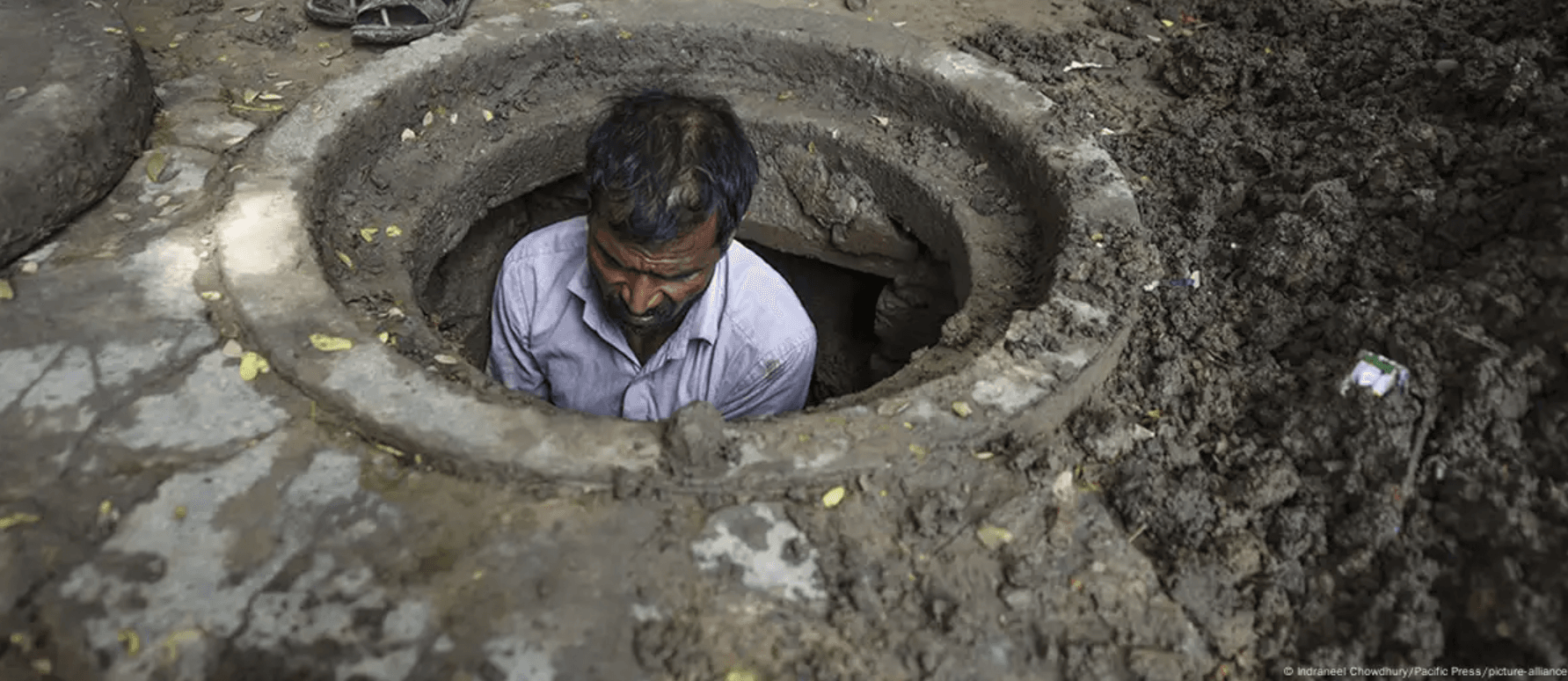Every year we observe state investment towards a better country, development, innovation and technology but on the other hand in the same country there exist people, the namesake citizens who are not even privileged of basic human treatment.
43 manual scavengers are known to have died just between the period of the interim budget to the presentation of the full budget of 2024-25.
The death of one sanitation worker
Between February and July 2024, 43 deaths were reported due to manual scavenging. More recently, in October 2024, 3 deaths were reported in Delhi and Jaipur each. Following these events, on the 4th of November 2024, a 24-year-old contractual security guard, Suraj Lohar was found dead inside a 21-foot-deep drain chamber in Anand Vihar. He was formally employed by the Delhi Jal Board as a contractual security guard but also made to work as a drain chamber cleaner.

In response to this, five members of the Dalit Adivasi Shakti Adhikar Manch (DASAM) advocacy group along with independent researchers conducted a preliminary fact-finding on 6 November 2024. Based on their investigation, a Fact Finding Report on the Death of One Sanitation Worker due to Manual Scavenging’ was compiled.
Upon investigation, it was found that the victim was formally employed as a security guard but instead worked as a drain chamber cleaner and was often forced to do so. He was reportedly working without any supervision or safety gear. It was also found that such drain chambers require at least 2 security guards and 2 safai karamcharis each for one shift of the day but in place of 4 workers, the victim was alone hired by the contractor. Suraj Lohar was 24 and came from an economically weak section of the society making him completely dependent on his job to make his and his family’s ends meet.
The work environment was also found to be quite atrocious. The work site was simply bereft of any basic facility. There were no provisions for any guard room, washroom or charging station. The site had two unfunctional CCTV cameras. The victim was found by his father and uncle who were looking for him inside the plant using their phone torchlights for there were no lights. While the contractor, Mandeep, has been held responsible for the death of the victim, an FIR has been registered, and the investigation is under process. The entire incident speaks for the prevailing inhumane practices within the country.
Following up on their parallel investigation of three sanitation workers who tragically lost their lives in Sarojini Nagar on 8th October, DASAM researchers reported uncooperative treatment by the authorities. The advocacy group investigators who were working towards helping the families of the victims revealed despite the tragic loss of life, the police have been extremely uncooperative in providing basic information about the incident. FIR and other crucial details of the victim’s family were not made available to make the process of compensation to families easier.
The entire incident depicts a series of malpractices and negligent acts which contribute to the deaths of such workers every year. Manual scavengers are subjected to inhumane conditions by force.
The undeniable relationship between caste and manual scavenging
According to the News Minute, “of the 38,000 workers profiled so far, 68.9 per cent belong to the SC community, 14.7 per cent to the OBC community, 8.3 per cent to the ST community. 8 per cent are from the general category. Put together, this indicates that 77.2 per cent of the workers are from Dalit communities.” Caste practices to date systematically depress members from the lowered castes.
Manual scavenging is one of the many social evils that the caste system gave birth to. It is the act of manually removing human excreta from dry latrines, railroad tracks and sewers by hand. It emerged as a caste-based practice designated to the lowest rung of the caste system, Dalits, earlier also called “achhut” meaning untouchable due to their association with the occupation.

The Brahmanical caste system originated as a form of social stratification based on occupation wherein the lowest castes were designated occupations such as handling the dead, cleaning the waste, butchers, leatherworkers and so on. This associated them as well as forced them into exposing themselves to such harmful tasks. The scavenging castes are known by different names throughout India such as Bhangi, Balmiki, Mehtar, Dom, Mukhiyar, Thoti, Chachati, Mehtar and many more. Manual scavengers are exposed directly to the toxic fumes of the waste often being fatal. Those involved in manual scavenging are also at health risk for numerous diseases such as leptospirosis, hepatitis, and helicobacter.
People standing at the intersection of this social and economic depression often see no way out to sustain their families and themselves. With no other employment option, they either take up these jobs or are forced into them because of their social background. There have been known cases of workers not being skilled or trained enough for the cleaning of septic tanks or sewers and still being pushed into it often proving fatal to them.
The lack of investment and progress in this direction is not just a technological oversight but a clear indifference towards improving the societal status of Dalits.
The National Action for Mechanised Sanitation Ecosystem (NAMASTE) launched in 2023 claims to ensure (i) zero fatalities in sanitation work, (ii) elimination of direct contact of sanitation workers with human faecal matter, (iii) all cleaning operations to be done through safety devices among other goals. The components include profiling of Sewer and Septic Tank Workers (SSWs); Health Insurance coverage under AB- PMJAY; Occupational safety training of SSWs; upfront Capital Subsidy for procurement of Sanitation Vehicles/Equipment; PPE kits to SSWs; safety devices to ERSUs and IEC Campaign for awareness of safety and dignity of SSWs all of which has mostly been on paper so far. Compensation to the families of the victims is still not provided for long. Initially, the budget allotted to this scheme stood at Rs. 97 crores which was reduced to Rs. 30 crores in the revised budget. This year, it has allocated ₹117 crore.
An injustice akin to slavery
The practice of manual scavenging is not just one with major health risks but in itself a degrading and demoralising task. It strips away the dignity of the individual. There is a clear relationship between manual scavenging and caste roles which should have been an age-old practice but remains to erode the lowest sections of the society but exploiting their already state of economic despair.

The very first law in the direction of rehabilitation of the Dalits was The Protection of Civil Rights Act, of 1955. But it is one thing to create laws and another to implement them. In 2013, the Prohibition of Employment as Manual Scavengers and their Rehabilitation Act made manual scavenging explicitly illegal in India.
As per surveys undertaken in 2013 and 2018, 58,098 people were engaged in manual scavenging formally in India and numbers unofficially may be much higher.
Death incidents highlight the continuing neglect of safety protocols and systemic failure in addressing manual scavenging. As per data, 377 people died due to the hazardous cleaning of sewers and septic tanks between 2019 and 23 in India. According to the same document, “effective” steps have been taken, such as “requesting” state and union governments to implement the provisions of The Prohibition of Employment as Manual Scavengers and their Rehabilitation Act, 2013 (MS Act). It may also be brought to attention that the act does not consider a person a manual scavenger if provided with any protective device or gear.
As per surveys undertaken in 2013 and 2018, 58,098 people were engaged in manual scavenging formally in India and numbers unofficially may be much higher.
In cases where Dalits attempt to socially and economically alleviate themselves, they are pulled back the deeply rooted societal roles. A report by Human Rights Watch exemplifies the situation quite well. One of the classic instances is when a man with an education in the field of banking and commerce was hired by the panchayat to clean toilets as he failed to find any other employment due to his caste. In another case in a village in Uttar Pradesh, a worker voluntarily stopped cleaning dry toilets, and men from the dominant Thakur caste came to their homes and threatened to deny them grazing rights and expel them from the village. Such threats force members of this section of society into these practices, they are afraid to report to the police since the affected face extreme difficulty in securing police protection, making them more vulnerable in cases where the police refuse to lodge their complaints due to caste bias within the local authorities.
About the author(s)
Ketki (she/her), is a curious political science student who loves exploring new ideas, places, and cultures. She has gained diverse work experience across event logistics, exhibitor relations, and research, always eager to learn something new. She has a soft spot for cats. In her free time, she loves to travel, listen to wildly different music and watch thrillers.





